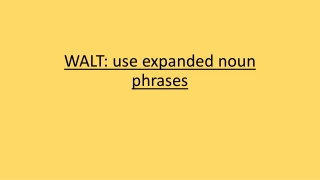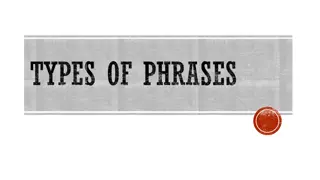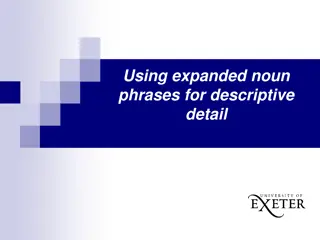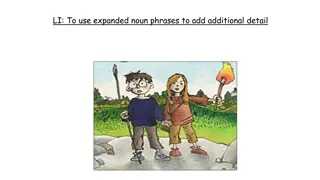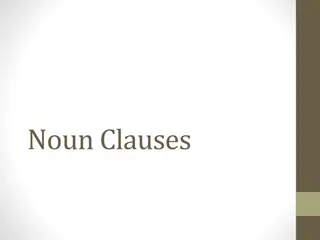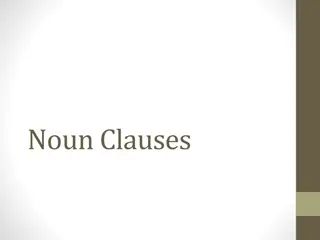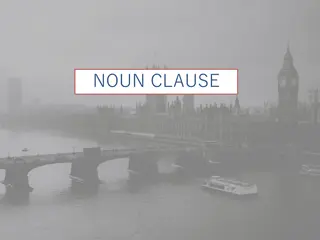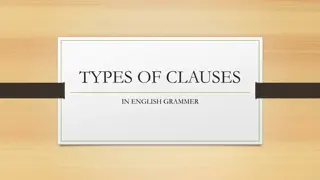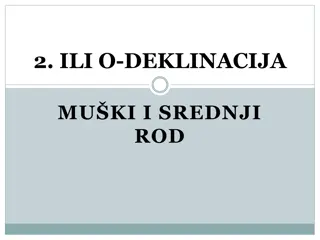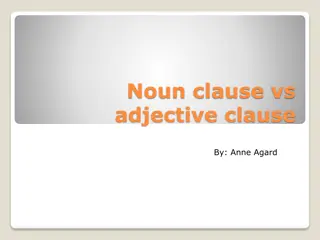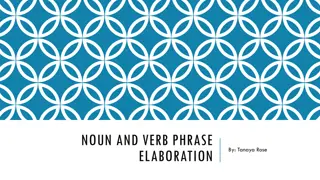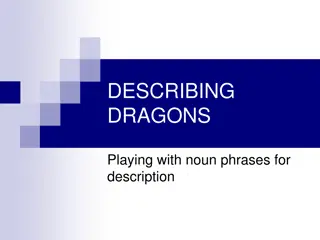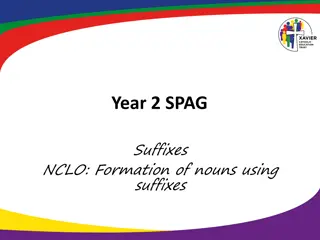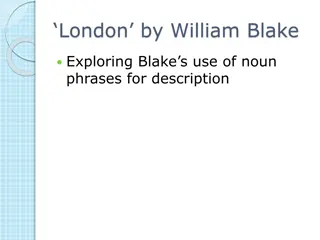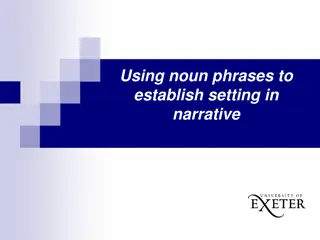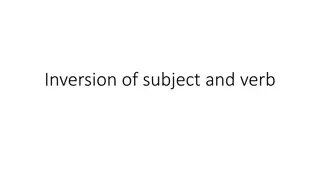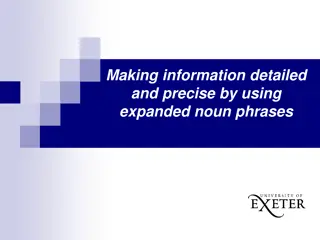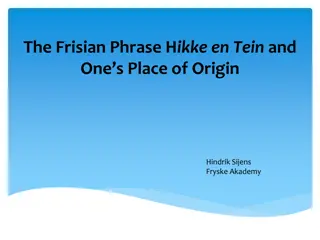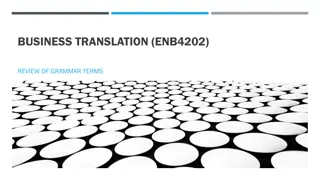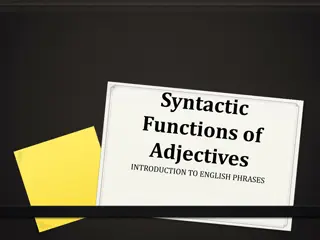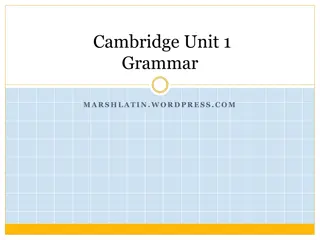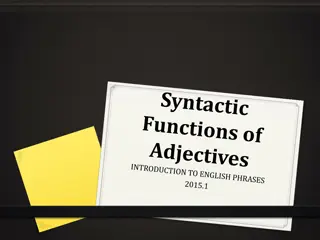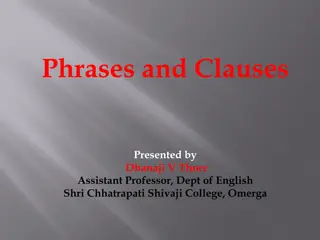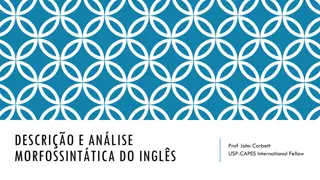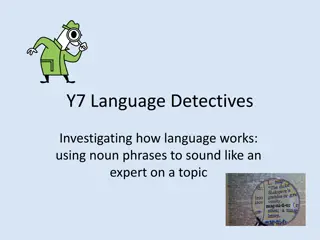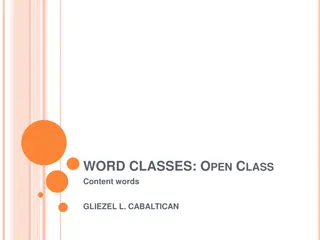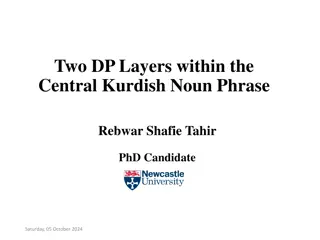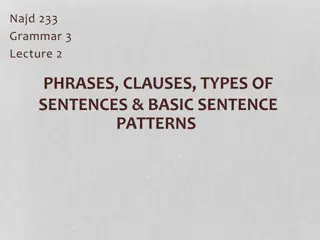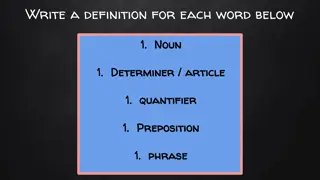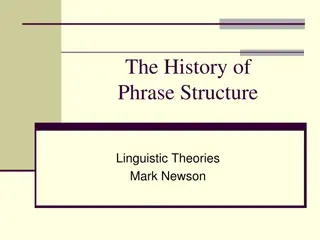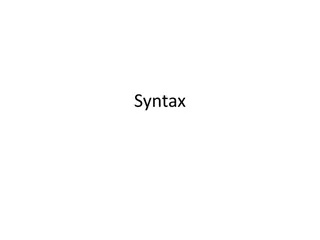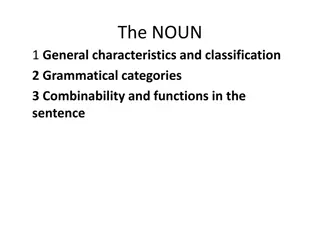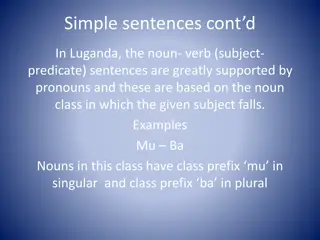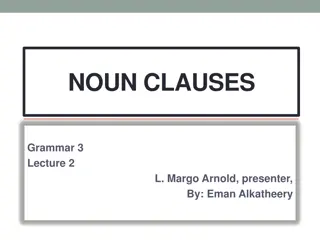WALT: use expanded noun phrases
Write expanded noun phrases using adjectives to describe Macbeth's appearance, characteristics, and surroundings. Enhance your writing skills with vivid details.
0 views • 5 slides
Understanding Different Types of Phrases in English Grammar
Explore the various types of phrases in English grammar, including noun phrases and adjectival phrases. Learn how modifiers can come before or after the noun in a phrase, and practice identifying these phrases in sentences. Enhance your understanding of grammar with clear examples and explanations.
1 views • 12 slides
Exploring Descriptive Detail Through Expanded Noun Phrases
Delve into the art of using expanded noun phrases for descriptive richness in writing, as showcased through authentic texts and engaging discussions. Uncover how these linguistic choices bring life to descriptions, enhance imagery, and spark creativity in readers' minds.
0 views • 6 slides
Enhancing Descriptions with Expanded Noun Phrases
Learn how to transform simple noun phrases into detailed descriptions by adding adjectives to create expanded noun phrases. Explore examples and engage in an activity to practice using expanded noun phrases to describe characters effectively.
0 views • 6 slides
Understanding Noun Clauses: Examples and Usage
A clause is a group of words with a subject and a verb, while a phrase lacks a subject and verb. Noun clauses, which function as nouns, can be subjects, objects of verbs or prepositions, and complements. They often begin with question words like what, when, or why. Examples illustrate their usage in
2 views • 49 slides
Understanding Noun Clauses in English Grammar
A clause is a group of words with a subject and a verb, while a phrase lacks one. Independent clauses can stand alone, while dependent clauses cannot. Noun clauses function as nouns in a sentence, serving different roles like subjects, objects, prepositional objects, and complements. They can start
1 views • 49 slides
Understanding Adjectivals in Noun Phrases: A Comprehensive Guide
Adjectivals, including determiners, adjectives, and nouns, play crucial roles in modifying nouns within noun phrases. This guide explores the different types of adjectivals, their positions within a phrase, the use of pre-headword modifiers such as determiners, and the order of adjectives and nouns.
1 views • 40 slides
Understanding English Imperative Sentences
English imperative sentences function as directives or commands, characterized by having no overt subject noun phrase, using an implicit second-person pronoun (you) as the subject, being tenseless with the base form of the verb, always indicating future actions, and not occurring in subordinate clau
1 views • 22 slides
Understanding Noun Clauses in English Grammar
A clause is a group of words with a subject and verb, while a phrase lacks one. Noun clauses, functioning as nouns, serve various roles in sentences. They can be subjects, objects of verbs/prepositions, or complements. Starting with question words like what, when, or why, these clauses mirror statem
0 views • 49 slides
Understanding Noun Clauses and Their Functions
A clause is a group of words containing a subject and predicate forming part of a sentence. Noun clauses act as nouns in a sentence and can function in various ways, such as being the subject or object of a verb, participle, or preposition. They are identified by asking "who" or "what" questions and
0 views • 23 slides
Present Perfect for Giving News: Verb-Noun Collocations and Usage
Study materials on using the Present Perfect tense for sharing news with just, yet, and already. Practice exercises in verb-noun collocations and identifying incorrect words. Explore examples of news messages and answer related questions. Learn how to express events that are connected to the present
1 views • 5 slides
Understanding Types of Clauses in English Grammar
A clause is a fundamental unit of a sentence, comprising a subject and predicate. Learning about the different types of clauses - Independent, Dependent, Relative, and Noun clauses - helps in enhancing grammar skills and sentence structure understanding. Independent clauses stand alone as complete s
2 views • 11 slides
Understanding Complements in Grammar
The word "complement" originates from Latin meaning to fill up or complete and is essential in completing the meaning of a verb. Complements can be a noun, pronoun, or adjective but never an adverb. They are never found in a prepositional phrase. Learn about direct objects, indirect objects, and pre
0 views • 15 slides
Noun Declensions in Latin - Rules and Examples
Explore the declensions of nouns in Latin for the second declension, including masculine and neuter genders. Learn about the endings for singular and plural forms, along with specific rules for each gender. Dive into the differences between masculine and neuter noun declensions with detailed explana
0 views • 7 slides
Understanding Adjective Clauses and Noun Clauses in English Grammar
Learn the key differences between adjective clauses and noun clauses in English grammar. Adjective clauses describe nouns, while noun clauses take the place of a noun in a sentence, serving as either the subject or object of a verb. Discover how to identify and use these clauses effectively through
0 views • 10 slides
Understanding Grammatical Development in Speech-Language Pathology
Explore a broader perspective of grammatical development in speech-language pathology focusing on noun and verb phrase elaboration. Learn about identifying and elaborating noun phrases, substitution tests, and the elements of an elaborated noun phrase. Gain insights into clinical approaches and lang
0 views • 28 slides
Mastering Noun Phrases for Vivid Descriptions
Explore the art of crafting compelling noun phrases to vividly describe dragons and other fantastical creatures. Learn techniques such as using determiners, hyphenated adjectives, prepositional phrases, similes, and relative pronouns to create imaginative and detailed descriptions. Elevate your writ
0 views • 15 slides
Exploring Noun Formation with Suffixes - Year 2 SPAG Activities
Dive into the world of noun formation using suffixes in this engaging Year 2 SPAG lesson. Discover how suffixes transform verbs into nouns, identify job titles by adding the suffix "-er" to action words, understand emotions through "-ment" suffixes, and recognize qualities with "-ness" endings. Enga
0 views • 10 slides
Analysis of William Blake's Use of Noun Phrases in "London
Exploring William Blake's poem "London," this analysis focuses on the use of noun phrases to describe people, places, objects, and emotions. By examining the nouns chosen by Blake and the patterns they form, we gain insight into the vivid and evocative imagery he creates. The expanded noun phrases i
1 views • 4 slides
Exploring Setting Through Noun Phrases in Narrative Descriptions
Establishing setting in narrative through the use of descriptive noun phrases is crucial for creating a vivid and immersive atmosphere. By carefully selecting and arranging nouns, authors can evoke specific moods and engage readers in a detailed visual experience. This approach enhances the overall
1 views • 6 slides
Understanding Inversion in English Grammar
Inversion in English grammar refers to the reversal of the usual word order of a subject and a verb in a sentence. This reversal often occurs when starting a sentence with an adverb or adverbial phrase of place, creating a more dramatic effect. Inversion is also seen in direct speech, where the subj
0 views • 11 slides
Enhancing Writing Through Detailed Noun Phrases
Explore the LEAD principles for connecting grammar with meaning and rhetorical effect in writing. Authentic texts are utilized to engage learners in deep metalinguistic learning. An interactive activity challenges readers to match descriptions with marine creatures based on detailed noun phrases. De
1 views • 6 slides
Exploring NLP and Machine Translation Through Examples
In the content provided, we delve into the concepts of Natural Language Processing (NLP), Machine Translation, and Phrase Alignment through various examples. The visuals illustrate phrase-based translations, alignment comparisons between Spanish and English sentences, and the integration of environm
1 views • 20 slides
Unraveling the Frisian Phrase "Hikke en Tein" and Its Origins
Explore the intriguing Frisian phrase "Hikke en Tein" and its rich cultural significance. Delve into its origins in Tytsjerksteradiel and the interpretations related to birthing, procreation, and movement. Uncover the various dimensions of this phrase through historical references and linguistic ana
0 views • 8 slides
Understanding Grammar Terms in Business Translation (ENB4202)
Explore key grammar terms such as action verb, adjective, adverb, article, clause, coordinating conjunction, dependent clause, gerund, linking verb, noun, noun phrase, object, phrase, preposition, pronoun, and subject in the context of business translation. Learn their definitions, functions, and ex
0 views • 14 slides
Understanding Different Types of Adjective Functions in English Grammar
Learn about attributive adjectives that modify nouns, predicative adjectives used with linking verbs, post-modifiers like reduced clauses, adjectives acting as the head of a noun phrase, verbless adjective clauses, and exclamatory adjective sentences in English grammar.
0 views • 7 slides
Understanding Latin Noun Cases and Declensions
Explore the use and distinctions of Latin noun cases (Nominative, Genitive, Dative, Accusative, Ablative), along with the concept of declensions, genders, numbers, and cases. Learn how to determine the declension, gender, number, and case of a Latin noun through its endings, and delve into examples
0 views • 23 slides
Understanding Adjective Phrases in English Grammar
Learn about different types of adjective phrases in English grammar, including attributive, predicative, post-modifier, head of a noun phrase, verbless adjective clause, and exclamatory adjective sentences. Explore examples and functions of each type to enhance your understanding of how adjectives a
0 views • 7 slides
Understanding Phrases and Clauses in English Grammar
This content dives into the concepts of phrases and clauses in English grammar, presented by Assistant Professor Dhanaji V. Thore. It explains how a phrase is a group of related words lacking a subject and predicate, while a clause contains both a subject and a predicate to form a complete sentence.
0 views • 23 slides
Understanding English Phrase Structure: Analysis and Examples
Explore the morphosyntactic analysis of English phrases and the grammatical hierarchy, delving into sentence constituents, clauses, phrases, words, and morphemes. Learn about different types of phrases, their structures, and elements like modifiers, headwords, and grammatical markers, with illustrat
0 views • 30 slides
Mastering Noun Phrases for Expertise in Language
Explore the power of crafting precise noun phrases to elevate your expertise on any topic. Unveil the secrets of using nouns strategically to convey depth and authority in your writing. Dive into the world of language detectives and uncover the nuances of language through the lens of noun phrases. E
0 views • 10 slides
Understanding Word Classes and Noun Functions in Grammar
Explore the concept of word classes such as open class and minimum free form, structural vs traditional grammar, count abstract vs concrete nouns, noun phrase extensions, properties of nouns, and noun functions in language. Enhance your understanding of adjectives, determiners, prepositions, and var
0 views • 28 slides
Understanding Definiteness in Central Kurdish Noun Phrases
The exploration of two DP layers within the Central Kurdish noun phrase reveals the application of functional elements to express definiteness. Examining the role of D-category and the morpheme -e sheds light on the markers of definiteness in CK, providing insights into prenominal demonstratives and
0 views • 20 slides
Understanding Phrases, Clauses, and Sentence Types in Grammar
A phrase is a group of words within a clause that conveys meaning, such as noun phrases, verb phrases, adjective phrases, adverbial phrases, and prepositional phrases. Clauses are groups of words containing a subject and a verb, with independent and dependent clauses being the two main types. Indepe
0 views • 33 slides
Understanding Noun Phrases: Definitions and Examples
Noun phrases are essential components of language that consist of a noun and other words that describe or modify it. This article provides definitions for key terms related to noun phrases, such as nouns, determiners, quantifiers, prepositions, adjectives, and adverbs. Examples and images help illus
0 views • 12 slides
Evolution of Phrase Structure Linguistic Theories
Explore the evolution of linguistic theories on phrase structures, from X-bar theory to Generalised X-bar theory in the 1980s. Understand how all phrases contain heads, complement phrases, and specifier phrases, shaping our understanding of language structures.
0 views • 33 slides
Understanding Syntax in Linguistics
Words in a language are organized into phrases and clauses with specific syntactic categories like Noun Phrase, Verb Phrase, and Adjective Phrase. Each phrase has a head such as a noun, verb, or adjective, and phrase structure rules help diagram the syntactic structure. Clauses are the largest units
0 views • 20 slides
Understanding the Noun: Characteristics, Classification, and Functions
The noun is a fundamental part of speech expressing various concepts such as names of objects, living beings, places, materials, processes, and more. It is characterized by semantic features, formal criteria including derivational features, grammatical categories like number and gender, and combinab
0 views • 18 slides
Luganda Noun-Verb Sentences and Pronouns
Explore Luganda noun-verb sentence structures supported by pronouns based on noun classes, specifically Mu-Ba and Mu-Mi, with examples showcasing singular and plural forms. Learn how to construct simple sentences using various nouns in these classes.
0 views • 6 slides
Understanding Noun Clauses in Grammar
Noun clauses are dependent clauses that act as nouns in sentences, serving as subjects, verb objects, prepositional objects, and complements. They should not be separated from main clauses with punctuation. Noun clauses can appear at the beginning of a sentence or after certain nouns, adjectives, an
0 views • 77 slides
